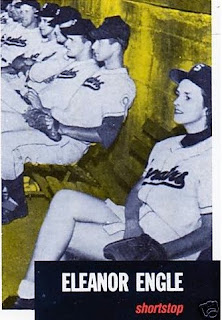
June 21, 1952, Harrisburg Senators baseball manager Butch Etchison discovered the he had a newly signed player on his team. The day before, a pretty 24-year-old stenographer had signed a contract and was about to become the first female player on an affiliated professional baseball team.
Etchison was furious. He had not been notified of the plans to sign the erstwhile softball star. He wanted her off the team. She showed up on game day in a Senators uniform that looked very much like the garb worn by female players in the All-American Girls Professional Baseball League. During the pre-game warm-ups she performed adequately to an appreciative crowd. Etchison made sure that she stayed off the field during the game.
The Senators were a struggling team in the floundering Interstate League. The team was sinking in the standings and attendance was dropping precariously. Perhaps team president Dr. Jay Smith was taking a page from the Bill Veeck Jr. playbook. Just as Veeck stirred the pot with his stunt of sending 3 foot 7 inch Eddie Gaedel to the plate as an actual member of the St. Louis Browns in 1951, Dr. Jay may have looked at Engle's signing as a gimmick to promote ticket sales.
In public, however, he defended her qualifications to be a member of the Senators, by telling the press that she could hit better than some of the guys on the club.
The irate Etchinson appealed to the head of the minor leagues, George Trautman, who was likewise outraged by the sacrilege. By June 23, Engle's contract had been voided. Trautman was quoted as saying that such travesties would not be tolerated. To back up his position, he warned all minor league teams under his authority that grave sanctions would befall any team that tried to sign a woman.
Working quickly, Trautman enlisted the help of Major League Baseball Commissioner Ford Frick. That very same day women were officially banned from all organized baseball.
Just two years earlier, Bonnie Baker was named as manager of the AAGPBL team in Kalamazoo. When the season ended, league officials banned females from managing a team in the all-female league. It takes a man to manage women players.
After Frick's edict, the travesty of a woman taking any man's job in the baseball world was forever averted. According to Brian McKenna in his book Early Exit that ban is still in effect.
Miss Engle's jarring ouster from baseball caught the media's attention locally and nationwide. Reporters and photographers dogged her everywhere she went. They waited in the hallway outside her office. They followed her to church.
Newspaper reports called her a "shapely brunette" and "the attractive rookie."
Bob Hope and Leo Durocher offered their encouragement. Her looks and compelling story could have been parlayed into a movie deal, but she chose to remain in the shadows. When she later went to work for a large corporation, her co-workers never knew of her flirtation with celebrity.
Her story became part of an exhibit at the Baseball Hall of Fame, but Engle refused to attend the event.
In 1991, Topps issued a baseball card as part of a 1953 reprint set (see photo in article). Engle appears sitting at one end of the bench and the male players at the other end. "The card looks like I'm a skunk at a picnic," she quipped
The power brokers of baseball could have allowed Eleanor Engle to try to prove herself. Had she failed, the world would know that women were not strong enough, skilled enough or fast enough to play with the big boys, or even the littler boys. But what if...?

No comments:
Post a Comment